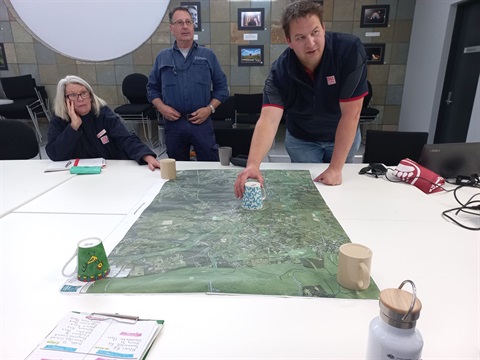Place-based Resilience Planning

Place-based Resilience Planning aims to strategically strengthen and prepare the townships of Healesville, Yarra Junction, and Monbulk. By facilitating community conversations, the project benchmarks resilience and develops "Township Action Plans for Greater Resilience."
These plans identify key values, assets, and opportunities to reduce bushfire risk and enhance resilience for the general community, businesses, and community-based organizations. The project also aims to minimize bushfire impacts through the development or review of Community Fuel Management Plans, focusing on effective fuel management treatments.
Key activities include:
- Phoenix fire modelling
- Identifying Fuel Management Zones and treatments, including private bushland fire access tracks
- Developing Community Fuel Management Plans
- Engaging landholders for coordinated on-ground works
The project fosters collaboration between local residents and emergency agencies, shaping community-based plans and grassroots emergency preparedness strategies.
Community Groups:
Healesville
The Healesville Community Emergency Group is developing a landscape-scale Bushfire Impact Mitigation Plan for the Healesville district that aims to minimise the risk of bushfires starting, spreading, intensifying and impacting life and property. It’s a strategic plan of landscape measures based on the latest science on bushfire behaviour and ecosystem responses to bushfire and prescribed burning.
The plan recognises that under the worst fire conditions, weather and terrain have a greater influence on fire severity than fuel loads. Accordingly, the focus is on fuel reduction in the immediate vicinity of assets and along strategic firebreaks in bushland, windbreaks and green firebreaks in rural areas and protection of bushland to allow ecosystems to mature to a less fire-prone state than forests that are regenerating from disturbance (logging, bushfire, prescribed burning). The plan makes recommendations for Built Assets wherever they occur (not just town centres), Rural Properties and Roadsides, Natural Ecosystems (remnant bushland and forests).
The group formed in 2017 under the auspices of the Safer Together program of DEECA and the CFA and commenced development of the current plan early in 2023 when Council obtained funding to support community-led fuel reduction plans for several high-risk towns.
For more information you can contact the Bushfire Planning team at earthcarepc@virtual.net.au.
Monbulk
Progress with the Monbulk Fuel Management group includes a comprehensive review of the 'Bushfire Fuel Management Guide,' in collaboration with DEECA and specialist contractors.
This document was developed around 2017 to act as a guide for townships completing fuel management plans.
Yarra Junction
"We aim to develop a community-led bushfire mitigation plan that reduces the severity of bushfire impacts on Yarra Junction and its surroundings. This plan will contribute to the safety of people and the natural environment while providing bushfire behaviour and mitigation information to the broader community. We hope to achieve this aim through education, awareness, and the reduction of fine fuel in the Asset Protection Zone."
"We consider fuel management to be an important and practical way to reduce the risks to life and property in the asset Protection Zone in the event of a bushfire moving towards Yarra Junction."
The Yarra Junction Bushfire Mitigation group recently organized a 'ground truthing' field day to assess on-ground fuel loads and vegetation.
After the ground truthing day, the group invited DEECA to a meeting to test their prescribed zones (Asset Protection Zone, and Bushfire Management Zone) against the predictions of Phoenix fire modelling. The results are positive, with a 16% reduction in residual risk for Yarra Junction, and if the management of the zoning is adopted by all key stakeholders, this could equate to potentially less assets impacted in Yarra Junction and surrounding townships.
Positive outcomes include a significant reduction in residual risk, highlighting the efficacy of prescribed fuel management zones.
Kalorama
The Kalorama group formed because the Kalorama-Mt Dandenong area faces a high bushfire risk due to its complex topography, dense vegetation, and high population. It was recognised that better outcomes could be achieved by combining localized fuel management on private land with public land management.
"Our aim is to develop a joint agency approach to fuel management, with the goal of reducing bushfire risk and its potential impact in the area."
"We see bushfire fuel management preparedness as vitally important because data and modeling have shown that strategic fuel management can greatly reduce the risk. Fuel reduction on private land is also crucial, and having a broader approach allows us to engage with our community to target areas that require work. This approach not only enhances community safety but also takes into consideration potential ecological, cultural, and environmental issues."
The Kalorama community (an additional high risk community to this project who are geographically close to Monbulk) have progressed well and have completed their review of their bushfire management plan.
Group members, through their general walking of the area, have compiled a list of properties of concerns, this has been sent through to Councils fire hazard inspection program and has informed Councils activities in this area.
The Kalorama Fuel Management Group is now focussing on community engagement in priority areas as identified by the plan, and also planning for community engagement events.